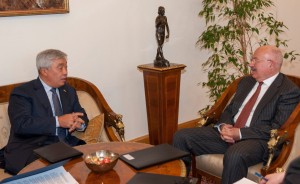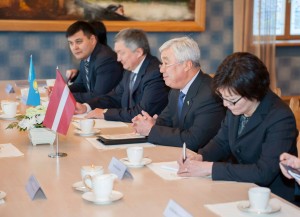RIGA – A delegation led by Kazakhstan Minister of Foreign Affairs Erlan Idrissov visited Hungary and Latvia Jan. 28-29 where they met with country leaders to discuss stronger ties with these two countries as well as with the European Union (EU) generally.
In the European capitals, Idrissov emphasized the meetings concerning EU cooperation had special meaning for Kazakhstan. The EU is Kazakhstan’s largest trade and economic partner and accounts for half of Kazakhstan’s foreign trade. Trade turnover for 2012 was $53 billion, the highest in history. And for the period of January-October of last year, turnover reached $46 billion. Forty-seven percent of foreign investments attracted to Kazakhstan’s economy originated from the EU.
An important subject of the discussions was preparation of a new Enhanced Partnership and Cooperation Agreement. This document is aimed at building a legal framework for transition to a more mature and dynamic stage of the partnership between Kazakhstan and the EU.
“It is fundamentally important to us to make the enhanced partnership agreement efficient in opening new prospects, specifically in areas such as liberalisation of the visa regime for Kazakhstan citizens, as well as cooperation in the science, technology and innovation spheres. In other words, the agreement must allow us to eliminate artificial obstacles to strengthening ties in the areas of science and business between our citizens,” Idrissov said during the meetings in Budapest, according to the Kazakhstan foreign ministry.
 In Budapest, Kazakhstan’s delegation participated in the international workshop “Strengthening partnership: Republic of Kazakhstan–EU.” The delegation also included representatives of Kazakh think tanks and government bodies, including Ministry of Transport and Communications, Ministry of Defense, Ministry of Industry and New Technologies, as well as Kazakhstan’s Institute of Strategic Studies, Institute of Oriental Studies, European Information Center and others. The European side was represented by a large group of experts and official figures, including EU Special Representative for Central Asia Patricia Flor, high level officers of the European Union External Action Service, Minister of Foreign Affairs of Hungary János Martonyi and other ministers of the Hungarian cabinet.
In Budapest, Kazakhstan’s delegation participated in the international workshop “Strengthening partnership: Republic of Kazakhstan–EU.” The delegation also included representatives of Kazakh think tanks and government bodies, including Ministry of Transport and Communications, Ministry of Defense, Ministry of Industry and New Technologies, as well as Kazakhstan’s Institute of Strategic Studies, Institute of Oriental Studies, European Information Center and others. The European side was represented by a large group of experts and official figures, including EU Special Representative for Central Asia Patricia Flor, high level officers of the European Union External Action Service, Minister of Foreign Affairs of Hungary János Martonyi and other ministers of the Hungarian cabinet.
During the event, Martonyi noted that Kazakhstan plays the role of a “bridge to the East” for his country, and Hungary, in turn, is ready to become a “bridge to the West” for Kazakhstan. “We share common history and roots. According to many studies, the historical motherland of Hungarians lies on the territory of modern Kazakhstan,” the head of Hungarian diplomacy said. He also underscored that he and his cabinet colleagues are ready to facilitate further rapprochement between Kazakhstan and the EU.
In Budapest, the parties also discussed opening access to the European skies for Kazakhstan-based airlines, visa regime liberalisation for Kazakhstan citizens, regional security, and energy issues. Around 70 percent of Kazakhstan’s oil export is shipped to EU countries, including Italy, the Netherlands, France, Austria and Romania.
Also during the visit to Budapest, Minister Idrissov held bilateral meetings with his Hungarian colleague János Martonyi, Minister of National Economy Mihály Varga and Minister of Rural Development Sándor Fazekas. During the meetings, the counterparts discussed the state and prospects of Kazakhstan-Hungary cooperation, preparations for a visit this year by President Nazarbayev to Hungary, as well as trade, economic, agricultural and education cooperation.
The Kazakh delegation’s meeting agenda in Riga echoed that of Budapest and Idrissov urged the Latvian diplomats to consider Kazakhstan a bridge connecting Europe and Asia. This corresponds with Riga’s “Eastern partnership” foreign policy to strengthen cooperation with the Central Asian region.
Kazakhstan-Latvian relations also received attention last year as a result of a visit by Latvian President Andris Bērziņš to Astana. And both countries are working to implement the agreements reached during that visit. The work seeks to increase the transit capacities of container trains Baltika Transit and Baltika Transit-2, launch direct air routes between Kazakhstan and Latvia, improve cooperation in the areas of tourism and agricultural products processing.
An important part of the Kazakhstan delegation’s visit was the speech of Minister Idrissov at the annual meeting of the heads of Latvia’s diplomatic missions abroad and representations to international organizations. A key question discussed among the diplomatic corps in Riga was its upcoming chairmanship of the European Council.
During the annual meeting, Latvian officials invited foreign diplomats to take the floor. Linas Linkevičius, the Minister of Foreign Affairs of Lithuania addressed the audience on Lithuania’s chairmanship of the EU in 2013. Head of EU diplomacy Baroness Catherine Ashton delivered a speech to Latvia’s diplomats and Minister Idrissov addressed the meeting’s participants concerning Latvia’s priority of strengthening relations with Central Asia in its future chairmanship at the EU.
During a vigorous question and answer session, Latvian diplomats expressed interest in Kazakhstan’s priorities in its European foreign policy direction. Among Kazakhstan’s European foreign policy priorities noted by Minister Idrissov during the session were Kazakhstan’s signing of an Enhanced Partnership and Cooperation Agreement with the EU, the easing of the visa regime for Kazakhstan citizens, as well as further boosting of trade, economy and innovation-technology cooperation.
In Riga, Kazakhstan’s Foreign Minister also held a range of bilateral meetings, including with Latvian President Bērziņš.
During the meeting with Bērziņš, the counterparts touched upon a wide range of mutual interests. The officials specifically emphasised providing an impetus to the economic side of bilateral relations. The parties also discussed cooperation in areas such as transit and transport, culture, small and medium-sized business development and cooperation within the EU and the European Council.
During the meeting with Latvia’s Saeima Speaker Solvita Āboltiņa, the parties discussed strengthening inter-parliamentary cooperation. They noted the success of groups working in the area of inter-parliamentary cooperation between the two countries. Chairman of Kazakhstan’s Mazhilis Nurlan Nigmatulin invited the Speaker of Latvia’s Saeima to visit Astana, according to the Kazakhstan foreign ministry.
In Riga, Idrissov met with his Latvian colleague Edgars Rinkēvič. The heads of the diplomatic authorities discussed pressing questions of the international agenda, prospects for boosting bilateral relations, as well as cooperation in the multilateral sphere.
Minister Idrissov also underscored the potential of transport and logistics cooperation with Latvia. “Access to the European logistical centres will allow beneficial transit of goods from Kazakhstan, other CIS countries and China through the Latvian ports to the European markets and back,” Idrissov underlined. An example of similar cooperation can be seen in the Kazakhstan wheat terminal at the Free Port of Ventspils through which Kazakhstan’s wheat is shipped to world markets.

